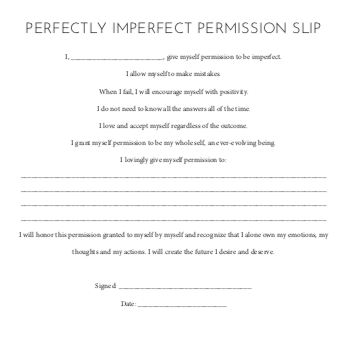 Most of us spend so much of our listening to our inner critic, building a habit of negative self-talk.
Most of us spend so much of our listening to our inner critic, building a habit of negative self-talk.
We compare ourselves to others and when we don’t measure up, we tell ourselves we aren’t good enough.
At work, we tell ourselves we aren’t smart enough and that it’s only a matter of time before everyone figures out that we are frauds.
Our bodies aren’t as perfect as we want, so we call ourselves fat, unattractive and therefore unlikeable.
Why are we such jerks to ourselves?? Never would we say these things to other people, but for some reason it’s totally ok to talk like this to ourselves.
STOP NEGATIVE SELF-TALK FOR GOOD
A free workbook to take you step by step to stop negative self-talk once and for all.
Why we have an inner critic spewing negative self-talk
The inner critic can serve several purposes that on the surface might seem useful. It can make you feel like you are trying to be better or to achieve more. But, self criticizing instead of using positive self-talk is the same as choosing a punishment over a reward.
Punishing someone for what they do wrong is not the same as teaching them how to do it right. Imagine if you yelled at a toddler learning to walk every time she fell down. You can imagine the negative impact that would have.
It would have a completely different effect than if you encouraged the child and smiled each time she took a step toward you. When your inner critic consistently labels you in a negative way, it has a demoralizing effect and shapes your larger self-concept about who you are and what you can do.
You might be asking – what if the critic is true? The truth is, it doesn’t matter! Negative self-talk is never in your best interest. In any given situation you can focus on what you did wrong or what you did well and what you can do better next time.
Negative self-talk becomes a habit
The challenge is that your negative self-talk has become a habit over the years.
The bad news is that habits can be hard to break. The good news is that with a little bit of work, they can be broken. The better news is that healthier habits can be created in their place.
Here are 5 steps to stop negative self-talk for good:
1. Catch yourself being negative
You can’t change a habit unless you are mindful of when you are doing it.
Just like if you want to lose weight by eating less, you need to notice when you are reaching for the cake.
Use mindfulness to notice that you’re doing it again. Mindfulness is paying attention to the present moment on purpose and without judgment. If you’re trying to break your habit of negative thinking, you might give yourself a hard time when you notice you’ve done it again.
To mindfully notice your negative self-talk, notice it without judgment. Try curiosity instead. “Oh look, I’m doing it again. Isn’t that interesting.”
[The downloadable workbook on this page has an exercise to help guide you to be more mindful of your negative thinking.]
2. Change your relationship with your inner critic
Once you’ve noticed your inner critic, it’s time to step back from it. Give yourself some space by being objective. Follow these steps to change your relationship with your inner critic.
Label what you are feeling.
What emotion are you feeling with these thoughts? Impatience? Anger? Inadequacy? Fear? Judgment?
Give your inner critic a name.
When, for example, you’re out and you find yourself thinking “no one here wants to talk to me” or at work you think “everyone here is smarter than me”, what you are feeling is insecurity.
It can be helpful to further distance yourself from the feeling by giving it a name. For this example, let’s call our insecurity Steve.
This might sound silly, but silly is a much more welcoming feeling than insecurity, fear, or anger.
Talk to your inner critic.
“Oh, hello Steve! Welcome to the party. Don’t you look adorable this evening. Please help yourself to some Hors d’oeuvres.”
This is the most subtle, yet profound shift you can make towards changing your relationship with your inner critic.
By doing this, you are stepping off of the negative thought train. You are stepping out from experiencing this emotion, and into viewing it with objectivity.
This is the place where you can make change happen.
3. Challenge your limiting core belief.
A belief is nothing more than a thought that you think over and over. A thought is nothing more than one of many ideas to choose from.
Figure out what your negative core belief is. You can do that by hearing the thoughts your inner critic is saying and ask “if this was true, what does that mean about me?”
For example, thinking “no one here will want to talk to me”. If that was true, that would mean I think I’m unlikable. Thinking “I’m going to mess this up” – if that was true, it would mean I think I’m a failure.
Figure out your limiting core belief:
Here are some example limiting core beliefs (there are more in the workbook):
- I am not good enough
- I am a failure
- I am unlovable/unlikable
- I am not smart enough
- I am helpless
- I am worthless
List all the evidence that contradicts that core belief.
Are you afraid of being seen as a failure? List all the ways you’ve succeeded in the past. Do you feel unlikable? List all your positive intrinsic values – i.e.: I am kind, I am generous, etc.
Replace your old core belief with a new one.
I’m not good enough becomes I am good enough.
I’m not likable becomes I am likable.
This becomes your new mantra. (you can use this in the next step)

4. Make positive self-talk your new habit
You’ve had this habit of negative thinking for a long time – years probably. That means the neurological pathways in your brain for negative thinking have grown strong. No wonder you automatically fall back on negative thinking!
Now it’s time to build new pathways in your brain by making positive thinking your new habit. You will need to find the right way that will work for you and feel true to yourself.
[Note that creating a new habit takes accountability. In the downloadable workbook on this page, you’ll find steps to help keep yourself on track to create this new habit.]
Ways to create a habit of positive self-talk:
Recite positive affirmations
One way to do this is to find the positive affirmations that strike feel great for you and write them on your mirror to read every morning. Or leave them on your bedside table to read before going to bed. This is a great use of your new mantra created from your new core belief.
Start a gratitude journal
Every day, or a few days a week, either write down or mentally note what you are grateful for. This is especially important to do when you notice that inner critic spewing negative self-talk. It will take you out of negative mode.1
Set a reminder on your phone
I have some clients who set reminders on their phone a few days a week and have a positive intrinsic value about themselves written in the label of the alarm. So at 3:30pm, an alarm pops up on their phone to say something like “I am a kind and generous person.”
Imagine feeling down on yourself, as you often do, and you get a reminder from your past self about something great about yourself.
Practice loving kindness meditation
A practice of loving kindness towards yourself and others can be a huge step towards cultivating a habit of positivity.
The following guided meditation on Loving Kindness is a practice in cultivating compassion, self compassion and empathy.
5. Write yourself a permission slip to be imperfect
hu·man | ˈhyü-mən: of, relating to, an imperfect being.
 When we say to someone “you’re only human” that’s another way of saying we are all imperfect.
When we say to someone “you’re only human” that’s another way of saying we are all imperfect.
Logically we know this, yet we fall into the trap of believing if we do not succeed 100% of the time, or if we do not meet expectations that we are deserving of our inner critic.
A permission slip is when a person of authority gives permission to someone to do something. With a personal permission slip, you are giving yourself authority over your own behavior to respond to difficult situations in a way that serves you.
Write yourself a permission slip to be imperfect. Just see how that feels. You may be surprised.
[There is a printable template for your permission slip in the free workbook on this page.]
STOP NEGATIVE SELF-TALK FOR GOOD
A free workbook to take you step by step to stop negative self-talk once and for all.
Where to go from here:
- Free Inner Voice Makeover workbook: Transform harsh self-talk into self-compassion with these 5 powerful steps to speak to yourself like someone you love. Discover the values hidden beneath your inner critic.
- 21 Day Meditation-in-Action: Retrain your brain in just 4 minutes daily. Create the mental space needed to connect with your authentic self and make values-aligned decisions.
- 1:1 Discovery Session: End the cycle of reactivity that leaves you feeling guilty, drained, and disconnected from your authentic self. In this focused 30-minute free consultation, we’ll identify your unique stress triggers and create a clear path to the calm response patterns you’ve been searching for. Transform stress into strength—starting now!
1https://greatergood.berkeley.edu/article/item/is_gratitude_good_for_your_health



waterfallmagazine
June 3, 2020 8:47 pmGreetings! Very useful advice in this particular article!
It is the little changes that make the most important changes.
Thanks for sharing!
Sandy Woznicki
June 29, 2020 4:25 pmThanks for commenting!